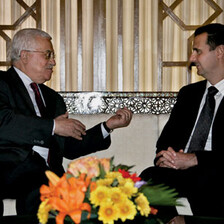Electronic Lebanon 1 April 2008
CAIRO, 1 April (IPS) - The 20th Arab League summit, convened earlier this week in the Syrian capital Damascus, drew relatively few heads of state, with both Egyptian President Hosni Mubarak and Saudi King Abdullah bin Abd al-Aziz choosing to stay at home. According to local commentators, the low level of diplomatic representation served to show up Syria’s isolation within the otherwise US-dominated Arab fold.
“Cairo and Riyadh — two main agents of US policy in the region — sent very low-level delegates with the aim of further isolating Damascus,” Abdel-Halim Kandil, former editor-in-chief of opposition weekly al-Karama, told IPS.
Held on Saturday and Sunday (29, 30 March), the two-day gathering was attended by representatives of all 22 member states of the Arab League (AL), with the exception of Lebanon. But of these, only 11 — including host Syrian President Bashar al-Assad — were heads of state.
Heavyweights Egypt and Saudi Arabia sent unusually low-level representation. Disdaining even to send foreign ministers, Cairo dispatched its minister of parliamentary affairs to the event, while Riyadh sent its AL representative.
According to official sources, both countries blame Damascus for hindering the settlement of Lebanon’s ongoing presidential crisis.
For four months, Lebanon has been without a president due to longstanding deadlock between the US-backed government of Prime Minister Fouad Siniora and the opposition led by resistance party Hizballah. Although the two sides have agreed in theory on a presidential nominee, they have yet to arrive at a mutually acceptable formula for political power sharing.
“The essence of Cairo and Riyadh’s dispute with Syria is the ongoing presidential crisis in Lebanon,” Mohamed Fouda, political analyst and former editor-in-chief of official daily al-Messa told IPS. “If Syria can’t solve the Lebanon crisis, how can they meaningfully discuss other problems facing the Arab world?”
“Lebanon has been without a president since November,” added Fouda. “This dangerous state of affairs could potentially lead to a civil war.”
In a press conference broadcast live from Riyadh during the summit’s opening session, Saudi Foreign Minister Prince Saud al-Faisal went so far as to call for AL sanctions against Damascus for supposedly defying Arab consensus on Lebanon.
Although it received a formal invitation from Syria, Lebanon did not send an official delegation to the summit. Siniora, speaking one day before the event, said the decision stemmed from Lebanon’s refusal to be represented by any person other than the elected president.
Cairo and Riyadh — both close allies of Washington — are also generally uncomfortable with Syria’s declared alliance with Persian-speaking Iran. They have also regularly expressed disapproval of Syria’s support for Islamic resistance groups in the Palestinian territories and Lebanon.
Echoing a common perception, Kandil attributed the Egyptian and Saudi position on Syria to the influence of Washington.
“The Egyptian and Saudi decision to send low-level diplomatic representation was a result of ‘advice’ from the US administration,” he said. “This was obvious from recent trips to the region by [US Secretary of State Condoleezza] Rice and [US Vice-President Dick] Cheney, both of whom regularly express their desire to see Syria further isolated.”
In advance of the summit, US administration officials did not hide their wish to see Damascus shunned for its alleged interference in Lebanon.
“In contemplating whether or not they attend a meeting in Syria, it certainly bears keeping in mind what Syria’s role [has been] to this point in not allowing a Lebanese electoral process to move forward,” US State Department Spokesman Sean McCormack said in a 13 March press briefing.
Nevertheless, Fouda disputed the assertion that Cairo’s decision to send low-level representation was a result of US prompting.
“I don’t think Egypt’s decision can be attributed to US pressure,” he said. “Mubarak declined to go to the summit due to the unresolved presidential crisis in Lebanon. Washington can’t force Cairo — or Riyadh for that matter — to take positions they don’t want to take.”
At the summit, al-Assad defended his country from charges of undue interference in Lebanon.
“Pressure has been exerted on Syria for over a year aimed at obliging us to interfere in the internal affairs of Lebanon — but we have refused to do so,” he said in an opening address. “The Lebanese people have their own institutions and constitution and are capable of achieving a solution themselves.”
In the absence of Lebanese representation, the summit’s agenda was devoted largely to the issue of Palestine, with several participants condemning recent Israeli military operations in the Gaza Strip. Delegates also discussed the future of the Arab Peace Initiative — which offers Arab recognition of Israel in exchange for territorial concessions — and recent Yemeni efforts aimed at reconciling rival Palestinian factions Fatah and Hamas.
Conference participants also exchanged views on the ongoing political and humanitarian disaster in Iraq, as well as current conflicts in Sudan and Somalia.
But local commentators say the event yielded little in the way of tangible results.
“The summit was nothing more than a formal tea party, lacking any serious discussion,” said Kandil. “Regardless of the relative levels of participation, this summit — like all AL summits within the last ten years — was of little practical value.”
He went on to note that Egypt’s relations with Syria — whatever the outcome in Lebanon — would continue to be dictated by decision-makers in Washington.
“When it comes to Syria, Cairo will carry on following US policy,” Kandil said. “So any improvement in Egypt-Syria relations will depend on Washington’s own relations with Damascus.”
All rights reserved, IPS - Inter Press Service (2008). Total or partial publication, retransmission or sale forbidden.
Related Links


